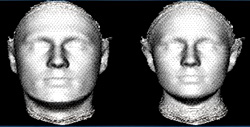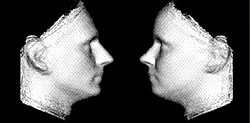A UT Dallas professor recently presented her research on biometric security technology to officials of the United Kingdom’s Home Office, which oversees the nation’s anti-terrorism and crime-fighting efforts.
Dr. Alice O’Toole, a professor of cognitive neuroscience in the School of Behavioral and Brain Sciences, went to London to present her findings at the Biometrics Exhibition and Conference. There, she participated in an international panel discussion of leading-edge applications for biometrics. Biometrics is the measurement of physical characteristics to identify individuals, such as fingerprints, DNA, retinal patterns or facial features.
During the October conference, the United Kingdom’s Home Office hosted a smaller meeting for prominent academics and government officials. The Olympics are slated for London in 2012, so security leaders were particularly interested in how biometrics might be used to protect against terrorism or other types of crime, O’Toole said.


The figures, which show information about gender, are part of research in the School of Behavioral and Brain Sciences Face Perception and Research Laboratories.
She presented her latest face-recognition research to a group that included representatives of the Communications-Electronics Security Group, the UK information assurance agency; the United States FBI; the British Foreign and Commonwealth Office; the Australian attorney general’s office; and the London Metropolitan Police, also known as Scotland Yard.
O’Toole studies facial recognition and evaluates how well evolving technologies work. Her team compares the rates of success using software to the rates for non-technological “expert” human evaluation. Recent findings indicate that a combination of computer analysis and human evaluation seems to be most effective in identifying individuals.
O’Toole is among a small number of researchers around the world looking at strategies that merge human and computer recognition. She said this approach seems to be gaining interest given its relevance to security.
The larger conference offered a chance for vendors – the companies and researchers who are developing biometric software – to get together with the potential customers, largely governments. O’Toole said it was interesting to learn about the use of biometric technologies as security tools in other countries and in U.S. federal agencies. The technologies are often used in screening the millions of visa applications received annually by the United States and other countries.
O’Toole said hearing from government officials about what they need from face recognition technologies and learning about the current uses gave her a better understanding of how her work might affect airport and border security in the future.
The studies in the School of Behavioral and Brain Sciences Face Perception and Research Laboratories are funded by the U.S. Department of Defense. The agency is seeking the most accurate and cost-effective way to recognize individuals who might pose a security risk to the nation.